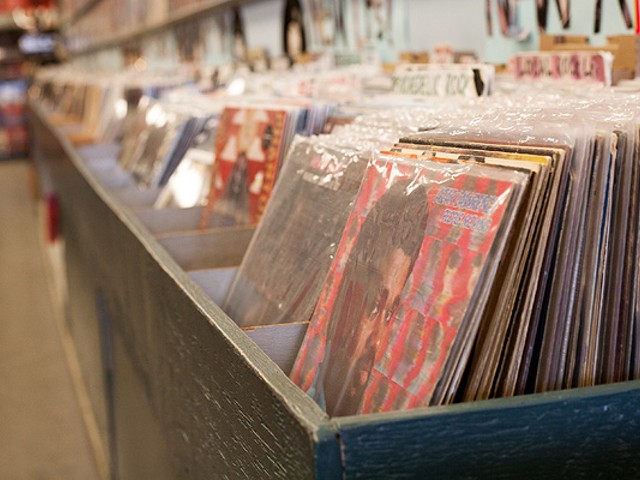Click here for Part Two of Mike McGonigal's interview with Jeff Mills.
Jeff Mills was born in 1963 and grew up in Detroit, where he was the most prolific and progressive of all the second wave of techno musicians. "The Wizard," as he quickly became known, has been at the forefront of so much in dance culture that it's impossible to think of techno without him. Most of what Mills has done bears his imprint irreducibly: from his very early use of multiple turntables and the way he stripped the sound down to its barest, most raw elements; to the exacting attention to aesthetic detail on the label artwork of his 12-inches; to the introduction of radical identity politics into the music with his amazing group Underground Resistance.
As a result of a slew of recent releases on his own Axis label, and his ongoing and expansive series of collaborative works at the Louvre museum in Paris as part of their Carte Blanche series, I spoke with Jeff Mills on the phone. He lives in Chicago these days, but I caught him in Florida. I totally forgot to ask him why he was there in the first place. Dude seems to work nonstop, so I seriously doubt it was a vacation. Since we spoke for almost two hours, the interview was split into two parts, of which this is the first.
Metro Times: I'm curious about the extent to which growing up in the age of NASA was an influence on you?
Jeff Mills: Convincing the public about how important space travel and going to the moon was to be was obviously quite crucial to the advancement of things. There was a very intense campaign to reach into the psyche of the average American to convince them that all that was justified. As a young kid in the late 1960s and '70s, you got swept up in that. From your lunchbox to your Halloween costume to reading Popular Mechanics to the cereal box to TV shows to cinema to cartoons and comic books, yeah! From what I remember, it was quite intense.
MT: The music was from the start, just with group names like Cybotron, techno was influenced by science fiction, if not science. Is that part of what attracted you to it?
Mills: Yes. And I have to assume that Juan [Atkins] was influenced by very similar things. It was that, and also in the context of all that was really happening in the latter part of the century. Things were moving faster, and technology was being introduced more into the popular culture. We were getting all these signals as to what the next century would be like. The album Computer World synthesized and reinforced what everyone was kind of feeling back then. My friends and I often used to think how old we would be in the year 2000, and what would that be like? So we used to talk about it and discuss it. We were all very sensitive to new, innovative things more than maybe my older brothers and sisters were. We felt that this was really going to be part of our lives. Kraftwerk were really speaking to us. The LED watch was really for us. The fax machine, that was for us.
MT: I have here a newspaper clip, "'The Wizard' Is Spinning His Magic at the Nectarine," from the Ann Arbor News, dated September 27, 1985. The pull quote reads "I feel that DJ's should pretty much put on a show," and I'm sorry to throw back words at you from when you were a kid, but you said "I feel that DJ's should pretty much put on a show. That's why I spin in the middle of the dance floor instead of up in the booth." My understanding of so much of your work, from collaboration with choreographers to film scoring, everything — I wonder if that impulse to expand the music simply continued. Is that fair to say?
Mills: Yeah, that would be fair. It was also what was happening at the time. That was the early to mid '80s, and DJ culture was really beginning to become more. I could see that it was becoming more than what it was a generation before, that to be a DJ also meant to have certain character, a certain style. All of those things helped reinforce the music that you were playing. That statement probably comes from what was happening in DJ culture as an art form. It was evolving. I could clearly see that people were paying more attention to the DJ when on the dance floor. So I don't want to be up in the booth, I wanted to be out on the dance floor, inside the party, so that I could have this type of interaction. We convinced the owner of the club to build this stage so that I could be with the crowd, not one story up way at the top of the place looking down on people. That transition, that gesture, that move gave those parties and the persona that I was creating at that time a very unique way of interacting with the people. They could see me, not just my head. I think that explained a lot to the people then about what a DJ could do.
MT: So you were interested in demystifying it?
Mills: Trying to reveal the mechanics of it, I suppose. How music is mixed and how far we can go with three and four turntables and integrated drum machines, and how at which point do I become a musician again. That almost theatrical way was what I was entering into by doing that.
MT: Would you say that some aspect of what you were doing there carried itself over into your Exhibitionist film project was, which you're about to debut the second and more interactive part of in Paris soon?
Mills: Exactly. It very much directly related. It was taking this a step further. In 2005, many people didn't understand exactly what a DJ was doing, because the DJ was always behind [turntables], or computer sequencing was emerging and DJs were bringing laptops. I thought that maybe then was a very good time to show the basics of what a DJ does — so that with every change in technology people can tell the difference, people can see the way things used to be and where things are going and have a better understanding. In the end, perhaps maybe have a better sense in order to determine the quality of things, the quality of the DJ's set, the best attributes of what a DJ can bring to that type of thing: the difficulty, mistakes, timing, all those things. I was convinced that the average people that go to parties still didn't understand it. By showing a DJ and showing what he does in many different perspectives, you can reveal the process of the art form. That's exactly what we did and now we're just working on the second edition of that, where it goes even further.






